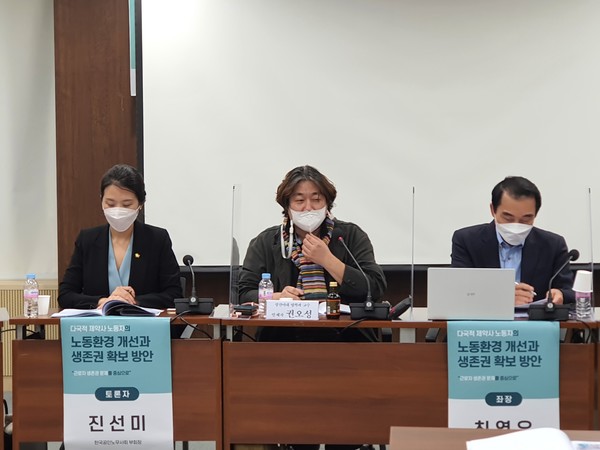Korea needs to enact a law to protect employees' legal status at multinational pharmaceutical companies during their employers’ restructuring process, including spinoffs, a legal expert said Wednesday.

Professor Kwon Oh-sung of the Department of Law at Sungshin Women's University stressed such a need during a discussion on how to secure the rights of foreign pharmaceutical company workers hosted by Rep. Yoon Jun-byung of the ruling Democratic Party.
"Corporate spinoffs have a significant impact on the legal status of their employees. However, there is no legislation to protect them in the nation’s commercial and labor laws,” Professor Kwon said. “The National Assembly, which has to resolve this problem through legislation, has also sat on its hands for nearly a decade.”
There is an unequivocal need for such legislation because some workers may be forced to transfer to a new company against their will, while others may be excluded even if they wish to move to a new company, Kwon pointed out.
The law professor stressed that it is important to ensure workers' right to participate in the decision-making process and express their views and positions before and during spinoffs.
"Currently, the Korean law provides detailed regulations on the coordination of interests between shareholders and creditors during corporate splits," Kwon said. "However, there are no regulations concerning workers and their unions during restructuring."
Kwon took the example of the Supreme Court’s ruling in 2013, often cited by the management in spinoffs, as another reason for such legislation.
"This verdict treated workers like tradable goods and made it possible for a company to conduct spinoff with just notification and without the consent of the employees," Kwon said. "While the ruling stipulated that the process should not be abusive, it stopped short of going into detail, leaving a bad precedent for workers."
In the past, the company had to prove that they did not use abusive procedures during the spinoff process. However, the 2013 precedent shifted the burden of proof to employees that the company excluded them from the decision process, Kwon added.
In foreign countries, including Germany, recognize the worker's right to veto their transfer to a spinoff. According to Professor Kwon, Japan and Austria also give workers the right to object and go through a certain procedure.
During the discussion, all participants agreed the 2013 Supreme Court ruling was flawed, and the National Assembly should enact a similar law.
"The Supreme Court allowed employers to unilaterally decide on the extent of succession by seeking understanding and cooperation from their employees before obtaining approval from shareholders," said Han Man-mock, the head of the A-One Labor Attorney Office. "However, we find it difficult to say procedural justification is guaranteed."
At the time of the spinoff, a dialogue procedure between labor and management on future working conditions is necessary, Han added.
However, the current legal system and precedents do not answer whether the matters agreed between the labor and management before the spinoff are inherited after the spinoff.
Kang Seung-wook, Pfizer Korea union leader, also said, "Given the current situation in which co-respect is emerging as an important agenda of society, the judgment of the judiciary needs to change."
It is necessary to interpret the law from the aspect of respecting workers rather than corporate-oriented thinking, Kang added.
Kang stressed that enacting a law on the succession of labor relations after a spinoff is the surest way to achieve such a result.

